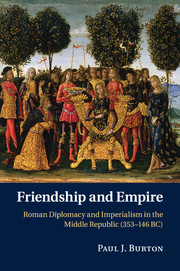Book contents
- Frontmatter
- Contents
- Preface
- Abbreviations
- Chapter 1 Discourse, International Relations, and International Relations theory
- Chapter 2 Friendship practices and processes
- Chapter 3 Amicitia incipit: beginning international friendship
- Chapter 4 The duties of international friendship
- Chapter 5 The breakdown and dissolution of international friendship
- Conclusion
- Bibliography
- Index
Chapter 5 - The breakdown and dissolution of international friendship
Published online by Cambridge University Press: 05 December 2011
- Frontmatter
- Contents
- Preface
- Abbreviations
- Chapter 1 Discourse, International Relations, and International Relations theory
- Chapter 2 Friendship practices and processes
- Chapter 3 Amicitia incipit: beginning international friendship
- Chapter 4 The duties of international friendship
- Chapter 5 The breakdown and dissolution of international friendship
- Conclusion
- Bibliography
- Index
Summary
Introduction
It remains to consider the evidence for the two distinct but closely related (and sometimes overlapping) processes of friendship breakdown and dissolution in the international sphere during the first great age of Roman overseas expansion. As was seen in Chapter 2, friendships in the interpersonal sphere in ancient Greco-Roman culture frequently broke down over perceived changes in one or both of the partners’ mores, or over perceived betrayals of the essential fides binding them together. A friendship in crisis could be resolved either by attempts at reconciliation, which involved confronting the relationship's ground rules, cost-to-benefit ratios, and moral parameters, or by a refusal by one or both parties to reconcile, in which case dissolution quickly followed. The analysis in Chapter 2 also revealed that, whereas modern friendships usually conform to a pattern of abrupt breakdown, followed by gradual dissolution and disengagement, the ancient evidence suggests that among the Romans, breakdown and dissolution were equally abrupt, almost simultaneous processes, so egregious were slights to honor considered – especially when they came from former friends and intimates.
The primary purpose of this study's final chapter is to determine whether international amicitiae in crisis followed a pattern similar to that of their interpersonal counterparts. The point of doing this, as has been the case throughout the previous two chapters, will be to show that amicitia (rather than clientela) is the appropriate paradigmatic relationship filter through which to view Roman imperialism and diplomacy. The much more difficult task here will be to demonstrate that the sanctioning moral language that passed between the Romans and their amici in times of relationship stress – the inverse correlate of the moralizing language that helped construct the initiation of amicitiae (above, Chapter 2) – was not “mere discourse,” but was both reflective and constitutive of the situational realities in which these states found themselves. It has been all too easy for scholars of Roman imperialism under the sway of IR Realist interpretations to dismiss ancient constructions of friendship breakdown and dissolution using the language of trust betrayal as moral cover or specious pretext for what was actually – transparently – aggressive, self-interested behavior.
- Type
- Chapter
- Information
- Friendship and EmpireRoman Diplomacy and Imperialism in the Middle Republic (353–146 BC), pp. 246 - 353Publisher: Cambridge University PressPrint publication year: 2011

